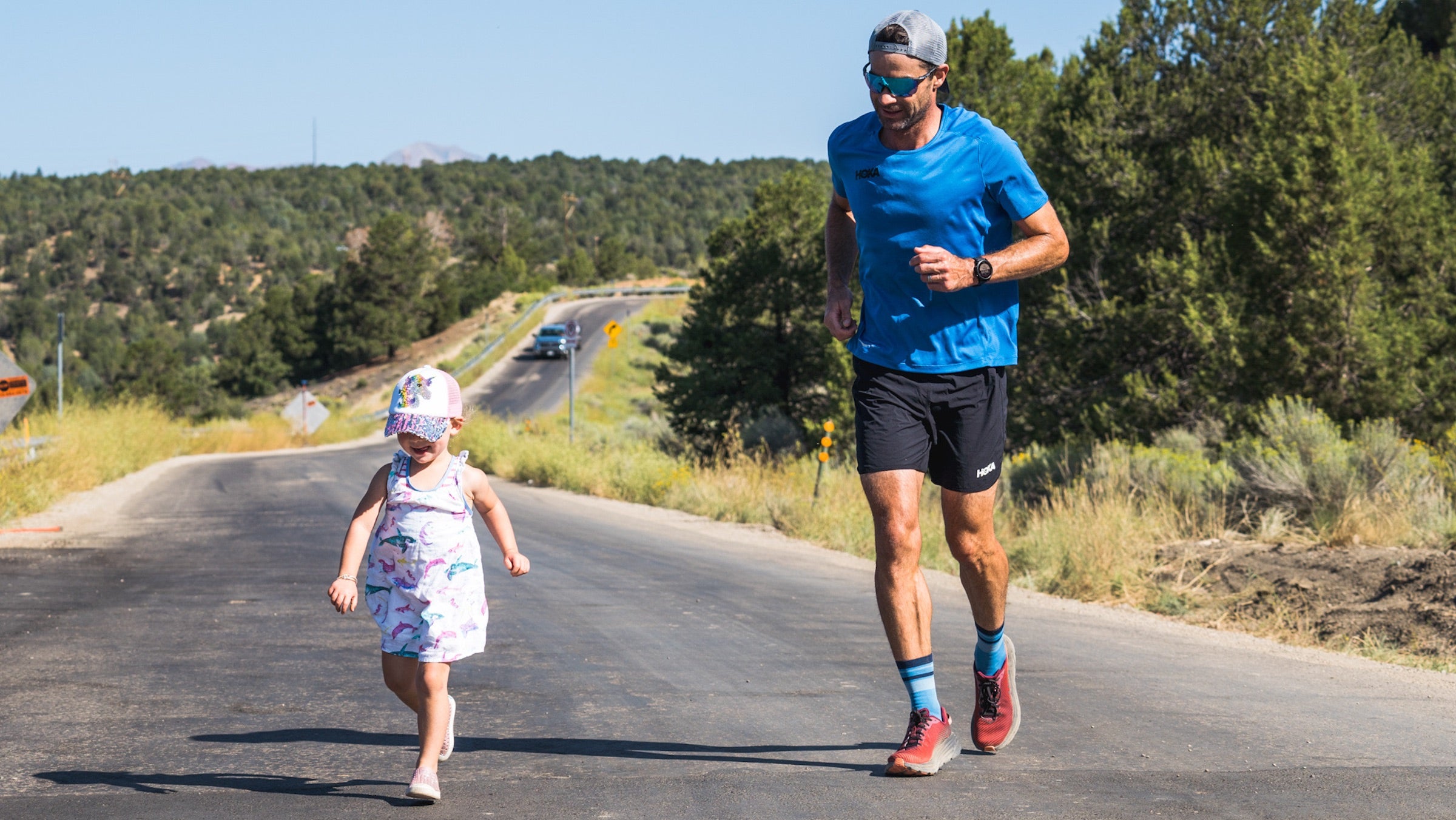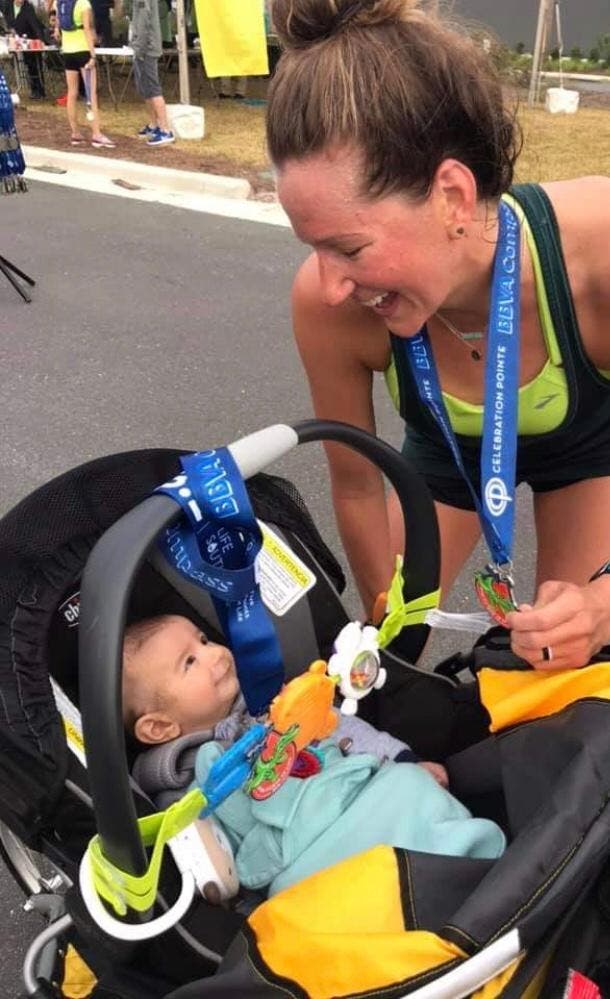The Benefits and Tricks to Training With Kids in Tow

Tim O'Donnell runs with their daughter Izzy. (Photo: Kenny Withrow/Tim & Rinny Show)
Every successful triathlete must possess some key traits: consistency, adaptability, and perseverance. As it turns out, there’s another segment of the population that has these qualities in spades—parents. Combine these two groups and you have the makings of the ultimate, if not slightly sleep-deprived, athlete.
Whether you’re adapting your race strategy because of a tire blowout or a blowout of a different kind, or you’re persevering through a 15 mph headwind or the 100th replaying of “Baby Shark,” parent triathletes have a unique skill set that can be an advantage when training and racing.
Of course, there are challenges that come along with training with kids in tow. Professional triathletes Tim O’Donnell and Mirinda Carfrae know this all too well as the parents of 3-and-a-half-year-old Izzy and 16-week-old Finn. “One big change I’ve noticed is that now I go back-to-back with some of my training sessions, instead of spreading them throughout the day,” Carfrae said. “Unless there’s something specific that’s scheduled for later in the day, I try to get all of my training done early, so I can spend as much time as possible with the kids in the afternoon.”
While it might not be ideal to get a bike workout in before the sun comes up, scheduling training for later in the day almost always results in sessions being shortened or canceled, because work ran late or the dinner bell is calling. In addition to the timing of workouts, O’Donnell believes quality over quantity is the best method for achieving success, especially for busy parents. “It’s just smart to be as efficient as you can be with your training,” he said. “Do your best to prioritize the sessions that are going to give you the best return on investment.”
Since the birth of her first child, Carfrae has noticed a definite decrease in her weekly training hours. However, the reduction didn’t have a negative impact on her overall fitness nor her performance in races. It was actually the opposite.
“My hours of training have definitely gone down, and the fluff sessions went out the window,” she said. “But, I was performing as well as, if not better, than I have at the 70.3 distance. I feel like quality definitely became more important over quantity. You can get similar results, if not better, with this method.”

With her family in Australia and O’Donnell’s on the East Coast, the Colorado-based couple does rely on the assistance of a babysitter now that Finn has joined the family. This brings up another important point: Don’t be afraid to ask for help.
“Our favorite thing is to bring Izzy to the gym,” Carfrae said. “Our strength coach is Izzy’s best friend. She has her run through dry-land obstacle courses. She actually watches Izzy on Sundays, when we do our long runs. She jokes that Izzy is her youngest client!”
The pro couple employs another creative method of involving their children in training sessions. “Last year, we tried to line up swim lessons for Izzy around the time when we were doing our swim workouts,” O’Donnell said. “She would come at the tail end of our practice, so she could see us swim. Then, we could sit in the hot tub with her before going off to the gym.”
Having their kids present and involved is important for Carfrae and O’Donnell, because they know that little eyes are always watching. They want to inspire their children to live active, healthy lives, while at the same time teaching important life lessons about hard work, dedication, and goal-setting.
Still, every parent—even pro triathlete parents—know there will be those days when you’re feeling overwhelmed and it seems impossible to get everything done. O’Donnell has a thoughtful approach to this situation. It’s a lesson he had to learn the hard way during a challenging Kona in 2017, when Izzy was just eight weeks old.
“Don’t be afraid to take a step back and reevaluate when things get overwhelming,” he said. “I’m a big believer that triathlon should be something that should enhance your quality of life and, hopefully, bring your family closer together. If it’s not doing that, then step back and take a different approach.”
“I’ve always had my best races, not when I was necessarily the fittest, but when I was in the best headspace. Especially in an Ironman, when the gun goes off, if you’re mentally fatigued because of everything it took to get to the start line, your fitness doesn’t matter. If you’re not in that mental state to really get into the zone, it’s hard to push your body in a race.”
Elyse Gallegos, an amateur athlete and winner of Ironman Florida 2017, is the mother of 2-and-a-half-year-old Neyland and five-week-old Griffin. She gets her training done by being as efficient as possible.
“If I have a babysitter for two hours in the morning, I will have Zwift pulled up, bib shorts on, and nutrition ready to go before the sitter gets to the house, so I can maximize every second of my time,” she said. “That typically means riding indoors versus outside, as well as more quality interval rides with specific watts versus riding outdoors with friends.”
In the past, Gallegos had a swim coach who enjoyed watching baby Neyland while she did her 5:30 a.m. workout. “It was a struggle for my sleep-deprived self; but, by 6:30 a.m., I’d already logged one workout and had ‘me time.’ This made me a better mom and wife, mentally, so I started my day ready to attack anything that came at me!”
She also incorporates her kids into daily workouts with stroller running and Mommy and Me strength training.

“I love that my toddler sees me swimming, biking, or running, or wants to join me in plyometric work. It’s truly motivating and makes workouts fun! I know you’re tired, hungry, and have 10 loads of laundry and a house to clean, but your persistence and dedication to training is something your kids see, admire, and will remember for a lifetime. Parenting is tough! It’s OK not to get that workout in. It’s also OK to tell your spouse to give you 60 minutes by yourself to log a solo workout. It’s all about balance and great communication.”
That’s a piece of advice that USAT L1 triathlon coach, Rob DeClercq, wholeheartedly subscribes to. In addition to being a coach, he works for DHL in shipping logistics and has three kids under the age of three.
“Communication with your partner is the number one priority, without a doubt,” he said. Having a mutual agreement and writing out a physical schedule makes it a lot easier to get the training in.”
During the week, his workouts tend to last 30-45 minutes, and he practices what he preaches to his athletes about being flexible if workouts need to be altered, because life happens.
“A question I get asked a lot is, ‘I can’t get everything in this week. Which workout is most important?’ That’s where the coaching comes in. If I have an athlete who is a former collegiate swimmer, then maybe that person needs to focus more on the run workout as a priority.”
“Like in an Ironman, the most successful athletes are the ones who can deal with a setback and not let it ruin their race. There will always be things you can’t control. You need to be adaptable.”
Like Gallegos, DeClercq is a big fan of stroller running and has completed several half-marathons with his kids. He has a few other helpful hints for parents.

“You will quickly figure out how long a child can last. I’ve learned that one-and-a-half hours is about the top. I definitely make sure to have cold water or juice, squeezable pouch snacks, and a pacifier handy. The nice thing about having a stroller is that I have a place to put my stuff too. Also, on race day, we have a race day checklist and a kids’ race day checklist.”
Depending on the day, he runs about 15-30 seconds per mile slower with the double stroller, so it’s important to have realistic expectations too. However, pushing all of that weight doubles as resistance training, so just think how fast you will be on a pure race day!
Parenting isn’t always pretty, and certainly not always easy, but triathlon isn’t easy either. Training with kids in tow can be a rewarding experience for both parent and child, as long as you remember to plan, prioritize, and practice patience.